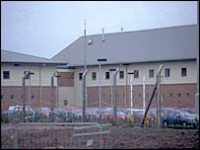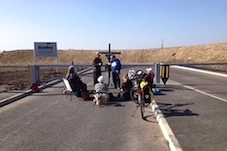Needed: Hope - Visit to an immigration detention centre

Yarl's Wood Detention Centre
Sonja Miley from the NGO Waging Peace, visited Sudanese refugees at Yarl's Wood detention centre. She sends this eyewitness report during World Refugee Week.
I volunteer with Waging Peace, a small NGO helping Sudanese dissident s in the UK. Waging Peace gives practical help to democracy campaigners and other Sudanese who have fled persecution. We find legal advice for people claiming asylum, as well as assistance with getting somewhere to live, opening a bank account, a mobile phone, and clothes for children.
But there are times when people who have escaped to the UK need someone to talk to, especially when they feel lost in the legal immigration minefield. Some Sudanese are held in detention centres while their appeals for asylum are considered. If their cases fail they face forcible return to Khartoum. That means arrest, interrogation, torture and possible "disappearance" at the hands of the Sudanese security services.
Waging Peace recognises how stressful and lonely it can be for people in detention centres, so we organise a visitor's group to provide moral support to Sudanese asylum seekers. Mostly the visitors are Sudanese already living in the UK who can offer people reassurance in their native language. However, Dr. Arama, the person I saw on my first visit, spoke perfect English.
It was a suitably cold, grey January day when I arrived at Yarl's Wood detention centre in Buckinghamshire, just outside London. I had no idea what to expect, and I was nervous, wondering how I could really help. What could I do?
As I prepared myself mentally to meet Dr. Amara, the prison-like atmosphere blindsided me. It wasn't the back-of-beyond physical location, nor being bussed to a walled-up, barbed wire fenced-in facility. It wasn't even the frosty reception from the front desk staff who only allow you to proceed once your fingerprints and photographs have been taken. Rather, it was the stark walls, barren but for one or two signs posting stern warnings that no visitor was to take anything - not a pen or paper, not an offering of food, not a book, not a sliver of any humanity from the 'outside' world, not even your own belongings - into the visitor lounge.
I had to remind myself that the woman I was about to meet was not a prisoner, she was a person, who happened to be an asylum seeker, there on humanitarian grounds, fleeing extreme conditions in her home country after being victimized by her own government and subjected to torture, rape and further trauma.
"Yarl's Wood detainees aren't there because they have been charged with a criminal offence:", reported BBC Home affairs correspondent Danny Shaw "They are people, many of them vulnerable, whose claims for asylum or right to stay in Britain have been rejected or are being challenged."
Yet, when Dr. Amara had gone to her weekly immigration sign-in 2 weeks ago, she was briskly taken into custody, without warning and with only the clothes on her back. Her personal belongings were taken away, and for several hours she was held in a locked room. No one told her what was happening. They bustled her into a van for the journey to an unknown destination - which turned out to be Yarl's Wood IRC, several hours away.
Not surprisingly, the experience reminded Dr. Amara of when she had been detained back in Sudan. Her unease increased when she was given "removal directions," with an airline ticket to return her to Sudan within a week. She had risked her life to escape from the Sudanese regime and she knew what awaited her if she was forced to return.
In order to meet her at Yarl's Wood I had to pass through a security scanner and I was patted down by an officer who made sure I was taking no more than £10 in with me. When the officer was satisfied, she unlocked the door to the visitor lounge and finally I made my way to find Dr. Amara.
All the while I was wondering how on earth I could help this woman who had endured so much? How can we tangibly measure the importance of Waging Peace through our Sudanese Visitor's Group and visiting people in detention?
I smiled as I approached Dr. Amara and without thinking I opened my arms. She offered me a brave but sad smile and with no words she collapsed into my arms, sobbing. I gently embraced her and when she was ready, we sat down and talked for the next two hours. It was finally clear to me, the value of what we do.
Through meeting people where they are, we don't have to 'do' anything. In a sense we offer hope and hope is immeasurable.
Below are comments from other Sudanese dissidents who have been visited at detention centres by representatives from Waging Peace.
Mohammed, now living in Cardiff, said, "The Sudanese government troops attacked my area and killed many people so I left Sudan because it was not safe. In 2009 a friend gave me the number for Waging Peace while I was being detained at Campsfield detention centre. I was at Campsfield for nearly 11 months. I didn't speak any English and wasn't able to speak to many people because I didn't have the language ability. To give me something to do and also help other people, I got work inside Campsfield. I was very depressed. It was difficult to be locked away, not speaking English, after my long and frightening journey from Sudan."
Dr. Ahmed, now living London, told me, "You supported me with many things - especially hope. At least I talked to someone. Even simply saying 'hello' helped me. Waging Peace also contacted my lawyer and if I wasn't happy with something or I didn't understand they would act on my behalf and support me."
Ezzeldin, now living in Manchester, remembers, "I didn't have family or friends to talk to and I was scared. I knew if I was sent back home I would die. I needed support and help with my asylum application. I totally broke down when I arrived. I tried to commit suicide two times while I was in detention. Waging Peace gave me emotional support and helped contact my lawyer. Unfortunately no Sudanese Visitors Group visits were allowed because of my mental state so I was very lonely. When I received a phone call from Waging Peace it felt like I received a message from God. Waging Peace's support was a lifeline for me."
Read more about Waging peace here: www.wagingpeace.info/


















